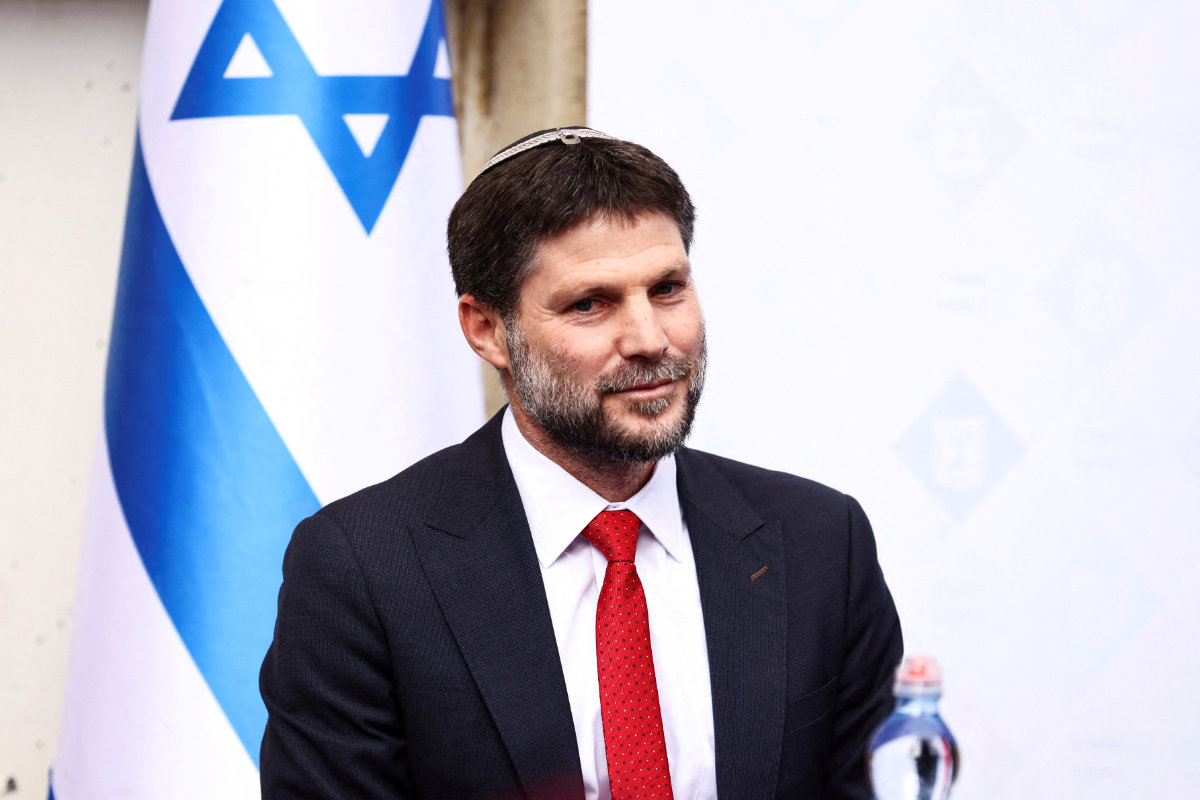JERUSALEM/JEDDAH: Israel publicly humiliated America’s top diplomat on Friday by launching a massive settler land grab in the occupied West Bank while US Secretary of State Antony Blinken was in talks with Israeli Prime Minister Benjamin Netanyahu in Tel Aviv.
Israel’s seizure of 800 hectares of land in the northern Jordan Valley on Friday was the single largest since the 1993 Oslo Accords. Israeli settlement watchdog Peace Now said the size of the seized area is the largest since 1993’s Oslo Accords, and that “2024 marks a peak in the extent of declarations of state land.”
Israel’s Finance Minister Bezalel Smotrich declared as “state lands” the area in the northern Jordan Valley, as US Secretary of State Antony Blinken arrived in Israel for Gaza war talks.

Israeli Finance Minister Bezalel Smotrich. (REUTERS/File Photo)
Israel captured the West Bank, east Jerusalem and the Gaza Strip in the 1967 Arab-Israeli war.
“While there are those in Israel and the world who seek to undermine our right over the Judea and Samaria area and the country in general, we are promoting settlement through hard work and in a strategic manner all over the country,” Smotrich said, using Israel’s term for the West Bank.
Settlements in the Palestinian territories are illegal under international law.
Smotrich, who heads the extreme-right Religious Zionism party, lives in a settlement.
Peace Now said the timing of the latest land grab was a “provocation.”
Despite opposition abroad, Israel has in recent decades build dozens of settlements across the West Bank.
They are now home to more than 490,000 Israelis, who live alongside around three million Palestinians in the territory.
The United Nations human rights chief has reported a drastic acceleration in illegal settlement building since Israel’s war against Hamas in Gaza began months ago, and said this risks eliminating any likelihood of a viable Palestinian state.
Blinken has described settlement expansion as “counterproductive to reaching enduring peace” with the Palestinians.
Netanyahu rebuffs Blinken
After their talks, Netanyahu said he had told Blinken that Israel would not reverse plans to launch a military offensive against Rafah in southern Gaza, where up to 1.5 million Palestinians have sought shelter after being driven from their homes elsewhere in the enclave.
“I told him that I hope we will do it with the support of the US, but if we have to we will do it alone.”
Blinken said Washington shared Israel's goal of defeating Hamas but a major military ground operation in Rafah was not the way to do it.
“It risks killing more civilians. It risks wreaking greater havoc with the provision of humanitarian assistance. It risks further isolating Israel around the world and jeopardizing its long-term security and standing,” he said.
Blinken had said he would push Netanyahu to take urgent steps to allow more aid into Gaza, where mass death from famine is imminent. US officials say the number of aid deliveries via land needs to increase fast and that aid needs to be sustained over a long period.
“A hundred percent of the population of Gaza is experiencing severe levels of acute food insecurity. We cannot, we must not allow that to continue,” Blinken said.
Eight people were killed on Friday in an airstrike on a house in Al-Naser, east of Rafah. The dead included a father, a mother and five of their children, said mourner Turkiah Barbakh.
“They are all children, they haven’t resisted or done anything. What happened to them is unjust,” she said. “How much longer do we have to endure this?”
In their meeting, Netanyahu sternly rejected the visiting US secretary of state’s plea not to launch a ground invasion into Gaza’s southernmost city of Rafah, saying Friday “we will do it alone” if necessary.
The looming Rafah invasion has cast a shadow over ongoing efforts to forge a ceasefire deal between Israel and Hamas. Blinken told reporters “there’s still a lot of work to be done” as he wrapped up his sixth trip to the Mideast since the war began.
International aid officials say the entire population of the Gaza Strip — 2.3 million people — is suffering from food insecurity and that famine is imminent in the hard-hit north.
Gaza’s Health Ministry raised the territory’s death toll to 32,070 people, with around 74,300 wounded. The ministry doesn’t differentiate between civilians and combatants in its count, but says women and children make up two-thirds of the dead.
Some 1,200 people were killed on Oct. 7 when Palestinian militants launched a surprise attack out of Gaza, triggering the war, and abducted another 250 people. Hamas is still believed to be holding some 100 Israelis hostage, as well as the remains of 30 others.
(With Agencies)




























